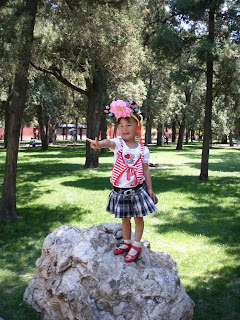Beijing with its dry climate is not like London where I went recently. There, we can see green grass and trees, and beautiful parks and squares everywhere. However, Beijing's parks are far older and more colourful than London's oldest parks.
Beijing's finest parks were mostly built by the emperors for their own enjoyment, and one not so well-known one that I like is what was formerly called Central Park, now called Zhongshan Park (after Sun Yat-sen). Sun Yat-sen was one of the early political leaders at the turn of the 20th century who managed to bring down the Qing dynasty and to kick out the emperors from the Forbidden City for good.
Zhongshan Park was a former imperial garden, right next to the Forbidden City, and contains structures from the Ming dynasty over 600 years ago. It is a fine example of classical Chinese landscape gardening.
This is the Confucian Altar of Earth and Harvests, built in 1421, on a 3-storey platform made of white jade. The emperors would come twice a year and pray for good harvests (spring) and offer thanksgiving (autumn). Note the 5 different colours of earth representing all parts of the country ( north, south, east, west and central), as well as the Five Elements (Earth, Wood, Fire, Metal and Water).

Next to the altar is a new concert hall, so you can have a stroll in the park before or after a concert for free!
There are also old cypress trees from 1000 years ago.
There are many quiet spots in the park, with charming names such as Lotus Pool, Water-side Pavilion, Pavilion of Four Contentments, Kiosk for Meeting New Friends and the Pavilion to Welcome the Sunshine.

One part is not so quiet, here you can see an amateur Chinese music group practising on their instruments, including the two-stringed 'erhu'.
Long corridors provide shade and are brightly painted, as can be found in other parks and palaces.
This is another Chinese instrument, a set of bronze bells. You will also come across a museum, no prizes for spotting an Olympic stadium or two in the model of Beijing city below.
And do you recognise this young-looking figure?
Interesting example of Taihu stone, called 'A Slice of Clouds', and which used to be in the Old Summer Palace.
We all love to have our photo taken, complete with imperial headdress..........
............and not just for kids!
Maybe the most impressive part of thepark is the moat at the northern end, where the watchtowers and walls of the Forbidden City can be seen.

It's a favourite spot for young couples to spend a lazy afternoon.

but what's this photo of a young girl doing here?
and another......praying for the deceased?
......details of age, height, looks, job, salary, assets.......
No, this is something I'm sure you've never seen, it's the area of the park where anxious mothers and fathers of unmarried sons and daughters will come to 'advertise' the availability of their children, in the hope of finding them a suitable marriage partner. So it's a kind of open-air matchmaking market, open at weekends and public holidays. Chinese parents think this is their responsibility, and probably think they know better than their kids who would be a suitable spouse. Luckily, I don't have this problem!
Perhaps this cartoon character, with the character 'fu' meaning happiness on his dress, is praying for good luck for the matchmaking! I also wish them goodluck, and if any of you need some help, I can take you to Zhongshan Park to browse around this special market.









































